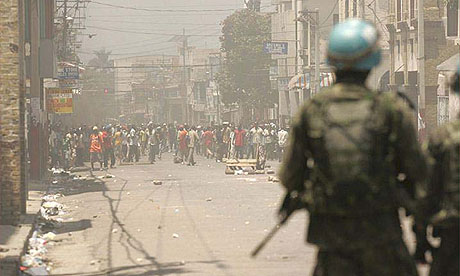Dady CheryApril 5, 2012
HAITI – For several weeks, armed groups of young black men, presumably Haitian and too young to be veterans of the Haitian Armed Forces (Forces Armees d’Haiti, FAd’H) disbanded in 1995, have been parading in military fatigues through Haitian towns. Some politicians and the Haitian press have been calling these men “former soldiers.” For the sake of accuracy, let us forgo this awkward and unfounded label and call them “men” or “gangs.” These marching men claim they want to enforce respect for the national sovereignty and get their back pay. One suspects their priorities are reversed.

These gangs have been around for months, but their more public appearances immediately followed massive demonstrations on February 29 to commemorate the 2004 coup against Aristide. The march had been organized by a new party of Lavalas supporters called “Ghettos-Unis” (United Ghettos). Over 10,000 people marched through Port-au-Prince chanting:
“Yes to democracy, no to reinstatement of dictatorship!”
… and proclaiming
“Intimidations will not make us back down! We don’t need your motorcycles, give your passport instead!”
with reference to Martelly’s refusal to deliver his passport to a Senate Committee investigating the citizenship of various government officials.
The appearance of the armed gangs has coincided with a rash of murders by gunfire. At least three members of the Haitian National Police (PNH), one lawyer and a well-known painter were killed this month (March 2011), but the most famous victims of the crime spree have been Jean Liphete (Ti Lifet) Nelson and Jean-Baptiste Jean-Philippe (Samba Boukman), both politically outspoken Fanmi Lavalas members and accomplished individuals who could probably have qualified for political office if this had been their ambition.
Unlike many of Haiti’s top politicians of dubious citizenship, Ti Lifet was born in Cite Soleil in 1974 and lived there all his life. He initiated among many things, Cite Soleil’s Radio Boukman which he was running, along with other projects that provided schooling for children, hot meals for elderly poor, and mobile clinics for the sick. He was loved and widely respected.
Samba Boukman was a charismatic musician and militant who is best known for having helped to broker a truce between the poor neighborhood of Bel-Air’s armed Lavalas partisans and the UN, when MINUSTAH was randomly blasting these neighborhoods with gunfire from tanks and helicopters after Aristide’s removal.
In addition Reginald Antoine, a labor leader and Director of Platform for Workers Unjustly Fired from Public Administration (Plateforme des Employés Injustement Révoqués de l’Administration Publique, PEVEP) had his entire entire family (sister and brother in law, and two children 2 and 10) killed by explosives on March 13 (AHP). Members of PEVEP had been protesting and demanding the benefits associated with their severance.

No comments:
Post a Comment